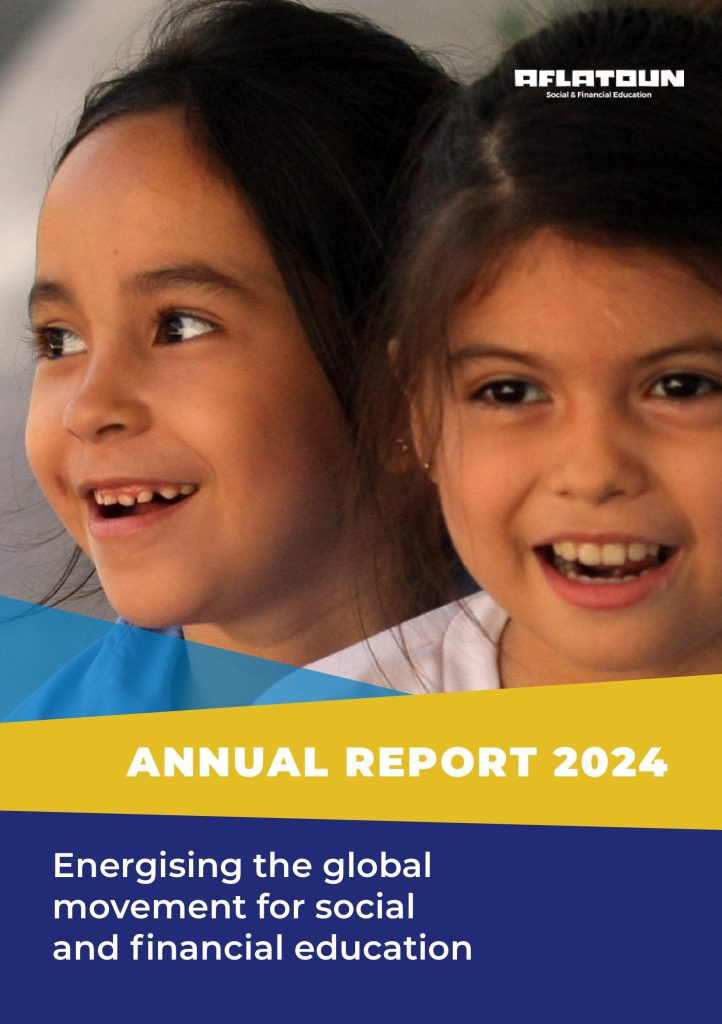Recent evaluations of Aflatoun's AflaTeen and AflaYouth programmes significantly impact young people's financial empowerment and life skills in challenging contexts.
Overview: the PROMESSE-FP programme
In the heart of West Africa, where young people face numerous socioeconomic challenges, Aflatoun’s comprehensive approach to Social and Financial Education makes a real difference. The PROMESSE-FP (Promoting Girls’ Access to Quality Education and Vocational Training Systems) programme implemented two key initiatives in Burkina Faso: AflaTeen for students aged 14-19 and AflaYouth for young women aged 15-35.
Recent mixed-method evaluations conducted between 2023 and 2024 provide compelling evidence of these programmes’ effectiveness, offering valuable insights for scaling similar interventions across Africa and beyond.
AflaTeen: Building financial foundations for students. Remarkable Financial Skills development!
The AflaTeen programme demonstrated impressive results in developing students’ financial capabilities. Through comprehensive training in budgeting and smart shopping practices, participating students showed a 28% improvement in overall financial skills. This substantial gain reflects the programme’s practical approach to financial education, moving beyond theoretical knowledge to hands-on application.
Comprehensive financial empowerment
Perhaps most significantly, the programme achieved a 16% increase in students’ financial empowerment – a holistic measure encompassing financial knowledge, skills, attitudes, and behaviours. The evaluation revealed that improvements were particularly strong in knowledge and skills acquisition, though attitudes and behaviours showed more modest gains, suggesting these deeper changes may require additional time to develop.
Enhanced life skills for real-world challenges
Beyond financial education, AflaTeen successfully improved students’ life skills by 2% overall, with particularly notable gains in human rights knowledge and HIV awareness. These results underscore the programme’s integrated approach, recognising that young people need both financial and social capabilities to navigate complex life decisions.
AflaYouth: economic empowerment for young women. Impressive employability improvements!
The AflaYouth programme delivered exceptional results for young women and girls, achieving a remarkable 90% improvement in self-employability and a 32% increase in paid employability. These figures highlight the programme’s effectiveness in preparing participants for diverse economic opportunities, whether as entrepreneurs or employees.
Boosting economic activities
Participants experienced an 80% increase in economic activities following the programme, with self-employment activities growing by 75%. This substantial growth demonstrates how targeted financial education can translate directly into increased economic participation and opportunity creation.
Significant women’s economic empowerment
Using internationally recognised frameworks, the evaluation found a 42% overall increase in women’s economic empowerment, with notable improvements across all three key dimensions:
- 46% increase in access to resources
- 30% improvement in agency (decision-making power)
- 21% growth in achievements (tangible outcomes)
Key success factors and insights – role of technology
Both programmes highlighted the crucial role of Information and Communication Technologies (ICT). Access to computers amplified AflaTeen’s impact on financial empowerment, while digital financial services – particularly mobile money and digital wallets – significantly enhanced AflaYouth participants’ economic activities.
Targeting vulnerable populations
The evaluations revealed that internally displaced students and young women often experienced greater benefits from the programmes, suggesting that Aflatoun’s approach is particularly effective for vulnerable populations who may have limited access to traditional financial services and education.
Grade-Level considerations
Interestingly, AflaTeen showed stronger impacts among junior high school students compared to senior high school students, indicating the importance of age-appropriate curriculum design and the potential benefits of early intervention.
Voices from the field
Programme participants shared powerful testimonials about their transformations:
“I’ve learned to do a good job and avoid unwanted pregnancies” – AflaTeen beneficiary
“The training has helped me streamline production and get more customers” – AflaYouth beneficiary
“Before, I didn’t save money in my mobile wallet… Now, I save the profits” – AflaYouth beneficiary
These personal accounts complement the quantitative findings, illustrating how the programmes create lasting behavioural changes that extend far beyond the classroom.
Strategic recommendations for scale
- Curriculum adaptation
The evaluations suggest that future programmes should tailor curricula to specific contexts, including:
- Age-appropriate content for different educational levels
- Integration of local economic realities and labour market demands
- Enhanced focus on financial attitudes and behaviours alongside knowledge transfer
- Technology integration
Given the amplifying effect of ICT access, programme design should prioritise:
- Digital literacy components
- Mobile money and digital wallet training
- Leveraging technology for peer networks and business promotion
- Extended implementation timeframes
The finding that attitudinal changes require more time than knowledge acquisition suggests that programme evaluations should allow sufficient post-implementation periods to capture the full impact of interventions.
- Inclusive targeting
The differential impacts observed between displaced and non-displaced populations indicate the importance of:
- Specifically targeting vulnerable groups
- Adapting content to address unique challenges faced by different populations
- Ensuring programmes reach those who need them most
Looking forward: Scaling impact
These evaluation results from Burkina Faso provide robust evidence that Aflatoun’s integrated approach to financial and social education creates measurable, meaningful change in young people’s lives. The programmes’ success in challenging contexts – including areas affected by insecurity and displacement – demonstrates their resilience and adaptability.
As Aflatoun continues to expand its reach across Africa and globally, these findings offer valuable guidance for programme design, implementation, and evaluation. The combination of strong quantitative results and compelling qualitative testimonials makes a powerful case for scaling these interventions to reach more young people who need these essential life skills.
The success in Burkina Faso proves that with the right approach, young people can develop the financial capabilities and life skills needed to build brighter, more secure futures – even in the most challenging circumstances.
Acknowledgments
We extend our heartfelt gratitude to the donors and partners who made the PROMESSE-FP programme possible. Their generous support and commitment to empowering young people in Burkina Faso has created lasting change in the lives of hundreds of students and young women across the Sahel, North, North-Central, and East regions.
Without this vital partnership and investment in youth development, these remarkable results – from improved financial skills to enhanced economic empowerment – would not have been possible. The success of AflaTeen and AflaYouth programmes stands as a testament to what can be achieved when donors, implementers, and communities work together toward a shared vision of empowered, financially capable young people.
Thank you for believing in the potential of Burkina Faso’s youth and for investing in their futures.
The PROMESSE-FP programme evaluations were conducted using rigorous mixed-method approaches, combining quantitative pre- and post-intervention data with qualitative insights from beneficiaries and programme managers. The findings represent the experiences of over 600 young people across the Sahel, North, North-Central, and East regions of Burkina Faso.












